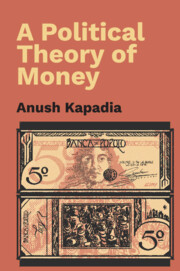3 - Bending, Not Breaking: Monetary Sovereignty and the Survival Constraint
Published online by Cambridge University Press: 14 September 2023
Summary
This chapter explains the nature and limits of monetary power using Minsky's idea of the survival constraint. This is the idea that all agents, including the state, need ‘cash’ to survive. The constraint binds more or less depending on the acceptability of a unit's liabilities. Banks accept borrower liabilities if they deem them solvent; citizens accept a state's liabilities, bonds and money, if they deem it legitimate. Political mutualisation drives super-acceptability, giving the state's bank disproportionate market power rather than untrammelled coercive power (‘fiat’). This enables the state's bank to bend the survival constraint much further than other domestic private entities.
(Neo-)Chartalism misreads this as pure coercive power. Since illegitimate coercion ceases to be state action and becomes a ‘crime’, state coercion is limited by legitimacy in principle. Put differently, brute coercion is less effective than legitimate violence, so a ‘state’ engaged mainly in brute coercion will be less effectively mutualised and therefore issue a poorer form of money.
Monetary power is the ability to modulate the survival constraint of other units, imparting elasticity or exerting discipline on a credit system. For the state and its bank, acceptability qua legitimacy forms one of its outer limits.
Capitalism is a cash nexus: we all need whatever is cojuncturally defined as ‘cash’ to fulfil our basic material needs. Minsky's ‘survival constraint’ is a Banking School rendition of this axiom. Most of us sell our labour power in order to avail ourselves of cash, which represents an ‘outside asset’ to us. By whatever method—earning, selling, borrowing—we must arrange our personal balance sheets to ensure that cash-in is greater than cash-out. This is what Minsky called the ‘survival constraint’: an economic unit cannot survive without positive cash flow; often it has to incur debts to get it.
Given that the state is itself embedded in capitalist relations of production, we will demonstrate how the survival constraint applies to the state itself albeit within much wider bounds. Political mutualisation at scale enables the state to bend the survival constraint further than any other domestic entity. The robustness and scale of a particular political mutualisation effort determine where the state sits in the international hierarchy of money.
The very logic of credit requires acceptance; this is another expression of the survival constraint. Chartalists assume away the problem of acceptance applied to the state because they have an inadequate conception of sovereignty.
- Type
- Chapter
- Information
- A Political Theory of Money , pp. 41 - 59Publisher: Cambridge University PressPrint publication year: 2024



